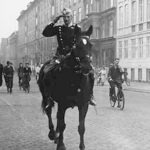I have not mentioned the air traffic controllers ‘strike’ because the media has talked of nothing else since the dreadful weekend at the beginning of December, when all air traffic over Spanish territory was cancelled at the orders, apparently, of AENA, the government-controlled body that manages Spain’s far too numerous airports (47 at the last count, many virtually unused, but the Ministry of Development is building more at towns you may never have heard of, like Teruel).
Now, however, the case is altered because our Government declared a state of emergency (called in Spain estado de alarma), and called in the armed forces to force the controllers back to their desks. This group of very highly paid but desperately overworked men and women had decided to ‘walk-out’ on 3 December, the first day of the puente de la Constitución holiday – a long one in which most Spaniards go somewhere else, very often by aeroplane. The airports at Madrid and Barcelona rapidly became rather like Dante’s Inferno. No aircraft was allowed to take-off, fly or land in Spain. Tourism lost thousands of millions of euros.
Now putting a democratic European state under what amounts to martial law is a serious step, and it appears to have been taken not by Zapatero, who is the President of the Government, but by Rubalcaba and Blanco, the first being First Vice-President and the second the Minister for Development (Fomento). The airports are José Blanco’s responsibility. This gentleman began calling the controllers, and of course the Popular Party, which is natural, every kind of name. They were ‘unpatriotic’ and ‘blackmailers’ and ‘traitors’ and so on. Some of the controllers did not help their situation by calling these two politicians ‘manipulators’.
The problems, according to the air traffic controllers, are that their very high salaries are paid to them following mutual agreement with AENA; that they are expected to carry out their profession, which is maintaining the life and security of airline passengers and crew with far too few of them at the airports, and under constant pressure; they are expected to work a colossal number of extra hours; if the controller is female and has a baby, the total number of days in her maternity leave are later added on to her compulsory working hours. Now, it seems, Spain’s government is bringing charges of sedition against the controllers who ‘walked away’. Some of them, the ringleaders I suppose, might have to go to prison for up to eight years, if the Fiscal General Sr. Candido Pumpido is to be believed. This seems a little illogical, when there are too few controllers anyway, and each one cost a lot of time and money to train for this exhausting and essential job.
It is one of the eccentricities of our strange modern life that an air traffic controller, in whose hands thousands upon thousands of citizens place their lives every time they catch a ’plane, is in actual fact paid far less than a youth who kicks a football for a living in a first division club.
The Government announced a state of emergency, which they said would last over a short period, during which relations between AENA and the controllers would be stabilized. This task has been patchily done, but the government has not raised martial law. It intends to continue it for an unspecified time. When asked about this, Zapatero replied in Parliament that it would last “not a moment longer or shorter than was needed”.
This declaration is the first since the times of Franco. It was not declared after the atrocious attack on the passenger trains at Atocha in 2004. It was not declared after the sinking of the oil tanker Prestige. It was not declared during the almost equally disastrous Metro strike in Madrid. Many columnists and editors of national newspapers are asking why. At the same time the conspiracy merchants are having a field day on the Internet, Facebook and Twitter.
One thing is certain: Mr Rodríguez Zapatero seems to have vanished into history, though he is still alive, grinning, and ‘chairing’ meetings of what we must obviously must call his ‘War Cabinet’. Actual power has been grabbed by Alfredo de Rubalcaba and his sidekick Mr. José Blanco. Both are wily and not really very nice. In their hands, God knows what will happen if the condition of martial law is, as we must expect, lengthened until January 15 or thereabouts. In case the Reader wonders what I am getting at, I must tell her that under martial law, the government is entitled, backed by the Law, to enter any field of endeavour it likes and start leaving armed colonels in offices to ensure the staff does what it is told. This includes the world of communications. The PSOE would like nothing better than to close certain newspapers and their associated television stations, such as La Gaceta/InterEconomía, El Mundo/Veo7 and of course ABC, which anyway is on the point of opening its own TV/radio station. We would then be reduced to having the PSOE-controlled El País as our very own Pravda. Nothing would suit Rubalcaba better. The next reform would be to ban the Popular Party and other nuisances from standing at elections. The following move would be to ensure that Spain becomes a one-Party state, without a Senate or a Monarch. Dear Readers, interesting times are afoot, unless Mr Rajoy awakens and persuades the two Nationalist parties PNV and CC to stop supporting the PSOE in every important vote. See you at the Gulag.








Leave A Comment